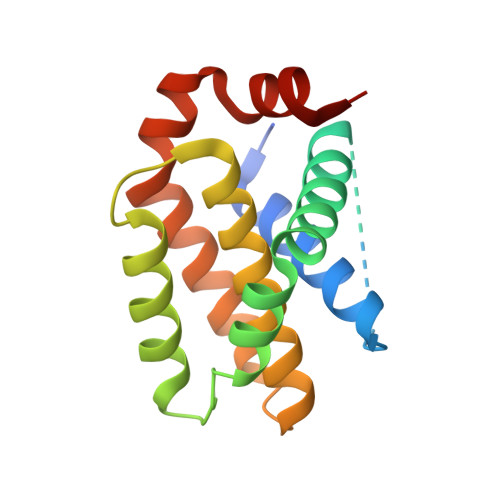ABT-199, a potent and selective BCL-2 inhibitor, achieves antitumor activity while sparing platelets.
Souers, A.J., Leverson, J.D., Boghaert, E.R., Ackler, S.L., Catron, N.D., Chen, J., Dayton, B.D., Ding, H., Enschede, S.H., Fairbrother, W.J., Huang, D.C., Hymowitz, S.G., Jin, S., Khaw, S.L., Kovar, P.J., Lam, L.T., Lee, J., Maecker, H.L., Marsh, K.C., Mason, K.D., Mitten, M.J., Nimmer, P.M., Oleksijew, A., Park, C.H., Park, C.M., Phillips, D.C., Roberts, A.W., Sampath, D., Seymour, J.F., Smith, M.L., Sullivan, G.M., Tahir, S.K., Tse, C., Wendt, M.D., Xiao, Y., Xue, J.C., Zhang, H., Humerickhouse, R.A., Rosenberg, S.H., Elmore, S.W.(2013) Nat Med 19: 202-208
- PubMed: 23291630
- DOI: https://doi.org/10.1038/nm.3048
- Primary Citation of Related Structures:
4LVT, 4LXD, 4MAN - PubMed Abstract:
Proteins in the B cell CLL/lymphoma 2 (BCL-2) family are key regulators of the apoptotic process. This family comprises proapoptotic and prosurvival proteins, and shifting the balance toward the latter is an established mechanism whereby cancer cells evade apoptosis. The therapeutic potential of directly inhibiting prosurvival proteins was unveiled with the development of navitoclax, a selective inhibitor of both BCL-2 and BCL-2-like 1 (BCL-X(L)), which has shown clinical efficacy in some BCL-2-dependent hematological cancers. However, concomitant on-target thrombocytopenia caused by BCL-X(L) inhibition limits the efficacy achievable with this agent. Here we report the re-engineering of navitoclax to create a highly potent, orally bioavailable and BCL-2-selective inhibitor, ABT-199. This compound inhibits the growth of BCL-2-dependent tumors in vivo and spares human platelets. A single dose of ABT-199 in three patients with refractory chronic lymphocytic leukemia resulted in tumor lysis within 24 h. These data indicate that selective pharmacological inhibition of BCL-2 shows promise for the treatment of BCL-2-dependent hematological cancers.
- AbbVie Inc., North Chicago, Illinois, USA. andrew.souers@abbvie.com
Organizational Affiliation:

















